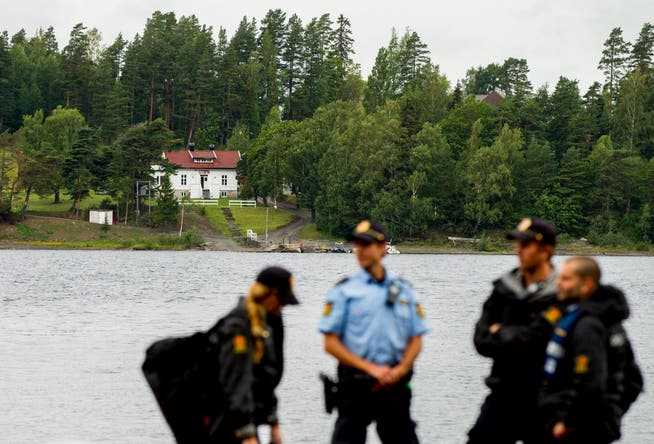In July 2011, Anders Behring Breivik killed 77 people in Norway. The acts in Oslo and on the island of Utöya are among the worst terrorist attacks in post-war Europe. Now the perpetrator is appearing in court for the first time in a long time.
Breivik appeared in court on Tuesday with a right-wing extremist message and the Hitler salute.
(dho./dpa) Around a decade after the right-wing extremist terrorist attacks in Oslo and on the island of Utöya, the perpetrator’s application for early release is being negotiated in Norway. Since Tuesday, the Telemark District Court has been considering whether convicted mass murderer Anders Behring Breivik can be released on parole after the minimum term of his sentence has expired.
At around 10 a.m., accompanied by several police officers, Breivik entered the gymnasium of the Skien prison, which had been converted into a courtroom, and used the start of the trial for right-wing extremist propaganda. From the start, the 42-year-old held up a poster with the right-wing extremist message “Stop the genocide of white nations” in front of him. Shortly afterwards he gave the Hitler salute. The same message was also attached to his suit.
Breivik now calls himself Fjotolf Hansen, but wished to be called Anders Behring Breivik in court. During the prosecutor’s statement, presiding judge Dag Björvik asked him to refrain from holding up placards with his political messages. First, prosecutor Hulda Karlsdottir addressed introductory words to the court. It was then the defense’s turn before a lengthy explanation from Breivik was scheduled.
The decisive question for the court in Skien – around 130 kilometers southwest of Oslo – is whether the right-wing terrorist still poses an acute danger and whether society must therefore be protected from him. It has scheduled three negotiation days and one reserve day this week. A court order is expected to be announced at a later date, possibly as early as next week.

The acts in Oslo and on the island of Utöya are among the worst terrorist attacks in post-war Europe.
Right-wing extremists and Islamophobic motives
Breivik, now 42, detonated a car bomb in the government district of Oslo on July 22, 2011, killing eight people. He then massacred the participants of the annual summer camp of the youth wing of the Social Democratic Workers’ Party on Utöya. 69 mostly young people were killed on the island. The crimes are considered the worst act of violence in Norway’s post-war period.
Breivik named right-wing extremist and Islamophobic motives for his actions. In the summer of 2012 he was sentenced by the Oslo District Court to the maximum sentence at the time of 21 years in preventive detention with a minimum term of ten years. This time frame included 445 days in custody. The minimum period thus expired on June 5, 2021, and the custody period is also deemed to have ended on June 5, 2032. In contrast to a normal prison sentence, however, preventive detention means that the sentence can be extended every five years – and it therefore remains unclear whether Breivik will ever be released from prison in Skien.
In September 2020, Breivik applied for “prövelöslatelse” – which literally means “release on trial”. However, even ten and a half years after the terrorist attacks, the public prosecutor still considers him to be someone who could commit serious crimes again and therefore to be a danger to Norwegian society. She is therefore striving for him to remain behind bars.
It is unlikely that Breivik will be released early. At his sentencing, the Oslo court found that even after he had served his sentence, in all likelihood he still had the intention and ability to commit many and very brutal murders. 21 years after the acts, the Norwegian democracy, which he wants to abolish, will continue to exist, the judges wrote in their verdict – including residents of different ethnic backgrounds, cultures and religions.
